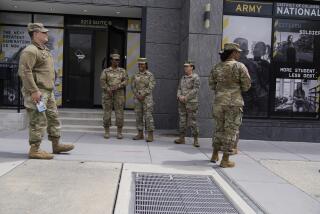Pentagon Says 5 Army Divisions Not at the Ready : Military: Preparedness taxed by missions in Haiti, Kuwait and Rwanda, defense secretary tells lawmakers. Report is likely to embarrass Clinton.
- Share via
WASHINGTON — The Pentagon disclosed Tuesday that five of the Army’s 12 combat divisions have suffered a significant decline in military preparedness, primarily as a result of cash-flow problems stemming from the deployment of U.S. troops to Rwanda, Haiti and Kuwait this past year.
In a letter to key lawmakers, Defense Secretary William J. Perry said that the erosion was caused because the Army was forced to cancel important maintenance operations and training exercises to offset the cost of the overseas operations.
The admission is considered likely to embarrass the Clinton Administration, which has denied allegations that military readiness is being impaired, while Republicans have warned that preparedness is being hurt.
Defense Department officials said two of the divisions that have been affected were among the rapid deployment forces that are the first to go in any combat operation. But they said that the gap involves shortages in equipment and personnel and is being quickly eliminated.
However, the damage incurred in the other three divisions would require additional funding. Those divisions include one heavy armor and two infantry divisions, all in so-called “later-deploying heavy reinforcing” units that are among the third tier deployed in a war.
Perry said in his letter that the Administration would seek supplemental appropriations to help bolster the Army’s operations and maintenance budget to offset the cost of the overseas deployments. He did not say how much that would entail.
Only a few weeks ago, Deputy Defense Secretary John M. Deutch testified to Congress that U.S. troops are better prepared than they were before the 1991 Persian Gulf War and that readiness is not a serious problem.
Defense Department officials insisted that Perry’s letter, which was made public in an unusual, hastily called late-afternoon briefing, was drafted sometime Monday, after the secretary learned about the apparent erosion in readiness in the three divisions.
Nevertheless, the briefing came hours after the release of a letter by Rep. Floyd Spence (R-S.C.), in line to be the chairman of the House Armed Services Committee, questioning Deutch’s assertion that readiness still is very high.
Spence and other conservatives have been warning repeatedly that the Administration has been cutting military spending too sharply to support the rise in peacekeeping missions, forcing the services to cut training and maintenance to meet budgets.
*
In their briefing for reporters Tuesday, Pentagon officials said that the problem came to light as a result of periodic readiness reports that the Army requires of its units. The reports chart each unit’s personnel, training, equipment on hand and serviceability of that equipment.
In the most recent report, three of the five units in question were rated Category 3--second from the bottom--”trained and ready to undertake many but not all” wartime missions. That means “the unit is deployable but it needs additional time” to get ready, officials said. The other two had relatively minor shortages in equipment and personnel.
Pentagon officials said that the decline stemmed from a fiscal-year-end squeeze in which maintenance and training were canceled or deferred so the Army could stay within its budget. They said that the cuts would not have been necessary had Congress approved more funds in time.
Officials said the Administration requested $1.7 billion in additional funds in fiscal 1994 but received only $1.2 billion. And it frequently took several months before lawmakers approved the appropriation legislation.
In his letter to Perry, Spence called the Administration’s previous reluctance to concede any decline in military readiness levels “classic symptoms of denial” and cited a spate of anecdotal evidence from Army units that he said showed problems.
“While official Washington may be trying to convince itself of this illusion, the picture from the field is markedly and disturbingly different.” He said that the Armed Services panel would conduct its own “field visits” next year to make its own assessment.
Sen. Strom Thurmond (R-S.C.), who will be chairman of the Senate Armed Services Committee next year, took a similar tack, arguing that the Administration already has overcommitted U.S. forces in Haiti and should bring the troops home soon.
More to Read
Sign up for Essential California
The most important California stories and recommendations in your inbox every morning.
You may occasionally receive promotional content from the Los Angeles Times.













